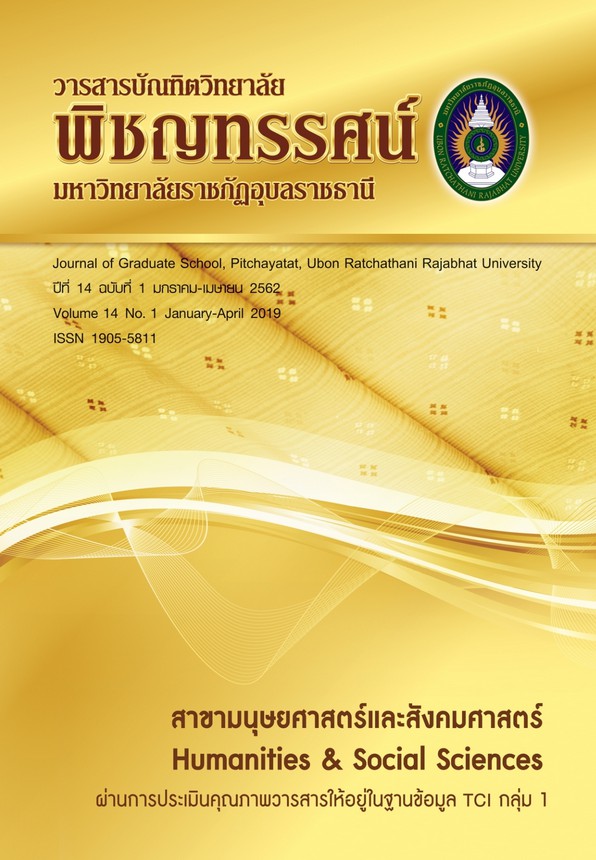องค์ประกอบและตัวบ่งชี้ของโกรว์ธ มายด์เซต สำหรับนักศึกษาหลักสูตรวิชาชีพครู
คำสำคัญ:
โกรว์ธ มายด์เซต, การวิเคราะห์องค์ประกอบ, นักศึกษาวิชาชีพครูบทคัดย่อ
การวิจัยครั้งนี้มีวัตถุประสงค์เพื่อศึกษาองค์ประกอบและตัวบ่งชี้โกรว์ธมายด์เซตสำหรับนักศึกษาหลักสูตรวิชาชีพครูและทดสอบความตรงเชิงโครงสร้าง โดยตัวอย่างในการศึกษาครั้งนี้ประกอบด้วย ผู้เชี่ยวชาญ จำนวน 11 คน และนักศึกษาหลักสูตรวิชาชีพครูจำนวน 700 คน เพื่อวิเคราะห์องค์ประกอบเชิงสำรวจ และ นักศึกษาหลักสูตรวิชาชีพครู 1,017 คน เพื่อวิเคราะห์องค์ประกอบเชิงยืนยัน โดยตัวอย่างทั้งหมดได้มาจากการสุ่มแบบหลายขั้นตอน เครื่องมือวิจัยเป็นแบบวัดโกรว์ธมายด์เซต มาตราส่วนประมาณค่า 6 ระดับ จำนวน 92 ข้อ วิเคราะห์ข้อมูลโดยค่าสถิติพื้นฐานค่าสัมประสิทธิ์สหสัมพันธ์ การวิเคราะห์องค์ประกอบเชิงสำรวจและ การวิเคราะห์องค์ประกอบเชิงยืนยัน เพื่อตรวจสอบความตรงเชิงโครงสร้างขององค์ประกอบ และ ตัวบ่งชี้โกรว์ธมายด์เซตสำหรับนักศึกษาหลักสูตรวิชาชีพครู ผลการวิจัยพบว่า 1. องค์ประกอบและตัวบ่งชี้โกรว์ธมายด์เซตของนักศึกษาหลักสูตรวิชาชีพครูมีทั้งหมด 6 องค์ประกอบ 20 ตัวบ่งชี้ ได้แก่ 1) ความเชื่อว่าความสามารถทางปัญญาพัฒนาได้ ซึ่งประกอบด้วย 3 ตัวบ่งชี้ 2) การต้อนรับความท้าทายประกอบด้วย 4 ตัวบ่งชี้ 3) การยืนหยัดแม้เผชิญกับความพ่ายแพ้ ประกอบด้วย 3 ตัวบ่งชี้ 4) การมองว่าความพยายามทำ ให้เกิดการเรียนรู้ ประกอบด้วย 3 ตัวบ่งชี้ 5) การเรียนรู้จากคำวิพากษ์วิจารณ์ ประกอบด้วย 3 ตัวบ่งชี้ และ 6) การหาบทเรียน และแรงบันดาลใจจากความสำเร็จของผู้อื่น ประกอบด้วย 4 ตัวบ่งชี้ รวม 20 ตัวบ่งชี้ 2. ผลการทดสอบความสอดคล้องของโมเดลความสัมพันธ์เชิงโครงสร้างขององค์ประกอบและตัวบ่งชี้ของโกรว์ธ มายด์เซตสำหรับนักศึกษาวิชาชีพครู พบว่า โมเดลมีความสอดคล้องกับข้อมูลเชิงประจักษ์ มีค่าสถิติวัดระดับความ กลมกลืนระหว่างโมเดลกับข้อมูลเชิงประจักษ์ ดังนี้ ค่าสถิติไคสแควร์ เท่ากับ 170.42 (P = 0.07324) ที่องศาอิสระเท่ากับ145 ค่าดัชนีวัดความกลมกลืนเท่ากับ 0.99 ค่าดัชนีวัดระดับความกลมกลืนที่ปรับแก้แล้วเท่ากับ 0.98 ค่าดัชนีรากกำลังสองเฉลี่ยของเศษเท่ากับ 0.02 และ ค่าดัชนีรากที่สองเฉลี่ยของความคลาดเคลื่อนในการประมาณค่าเท่ากับ 0.01 โมเดลองค์ประกอบและตัวบ่งชี้โกรว์ธมายด์เซตสำหรับนักศึกษาหลักสูตรวิชาชีพครูมีความตรงเชิงโครงสร้าง โดยมีน้ำหนักความสำคัญเรียงตามลำดับจากมากไปน้อยดังนี้ มองว่าความพยายามทำให้เกิดการเรียนรู้ เรียนรู้จากคำวิพากษ์วิจารณ์ ยืนหยัดแม้เผชิญกับความพ่ายแพ้ หาบทเรียนและแรงบันดาลใจจากความสำเร็จของผู้อื่น ต้อนรับความท้าทาย เชื่อว่าความสามารถทางปัญญาพัฒนาได้ มีค่าน้ำหนักองค์ประกอบ 0.93, 0.84, 0.86, 0.85, 0.77 และ 0.76 ตามลำดับ
เอกสารอ้างอิง
วันวิสาข์ เคน. การเรียนรู้แห่งศตวรรษที่ 21. กรุงเทพฯ: openworlds, 2556.
สารสนเทศอุดมศึกษา .นักศึกษารวม 2558 ภาคเรียนที่ 1ในสถานบันอุดมศึกษาทั้งหมด จำแนกตามสถานบัน กลุ่มสถาบัน เพศ ระดับการศึกษา คณะ ชื่อสาขาวิชา (จำแนกตามชั้นปี). (ออนไลน์) 2558 (อ้างเมื่อ 15 กันยายน 2558). จาก http://www.info.mua.go.th/information/index.php
Aronson, J., Fried, C., & Good, C. Reducing the effects of stereotype threat on African American college students by shaping theories of intelligence. Journal of Experimental Social Psychology, 38 (2002): 113-125.
Boaler, J. Ability and mathematics. The mindset revolution that is reshaping education. In Forum 55 (2013): 143-152.
Dweck, C. S. Self-theories: Their role in motivation, personality, and development. New York, NY, US : Psychology Press, 2000.
............. Mindset: The new psychology of success. New York: Random House, 2006.
............. The secret to raising smart kids. Scientific American Mind, 18, 6 (2007c): 36-43.
............. Even geniuses work hard. Educational Leadership 68, 1 (2010a): 16-20.
............ Mind-sets. Principal Leadership 10,5 (2010b): 26-29.
............ Mindset: How you can fulfil your potential. Robinson: Hachette UK, 2012.
Hair, J. F. et al. Multivariate data analysis (6). Upper Saddle River, NJ: Pearson Prentice Hall, 2006.
Mangels, Jennifer A., et al. "Why do beliefs about intelligence influence learning success? A social cognitive neuroscience model. Social cognitive and affective neuroscience. 1, 2 (2006): 75-86.
ดาวน์โหลด
เผยแพร่แล้ว
รูปแบบการอ้างอิง
ฉบับ
ประเภทบทความ
สัญญาอนุญาต
บทความทุกเรื่องได้รับการตรวจความถูกต้องทางวิชาการโดยผู้ทรงคุณวุฒิภายนอกอย่างน้อย 3 คน ความคิดเห็นในวารสารพิชญทรรศน์เป็นความคิดเห็นของผู้นิพนธ์มิใช่ความคิดเห็นของผู้จัดทำ จึงมิใช่ความรับผิดชอบของวารสารพิชญทรรศน์ และบทความในวารสารพิชญทรรศน์สงวนสิทธิ์ตามกฎหมายไทย การจะนำไปเผยแพร่ต้องได้รับอนุญาตเป็นลายลักษณ์อักษรจากกองบรรณาธิการ





